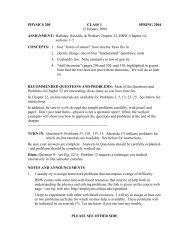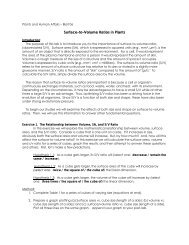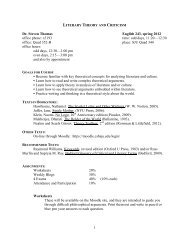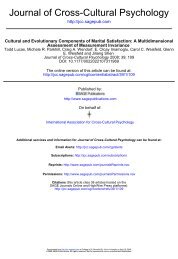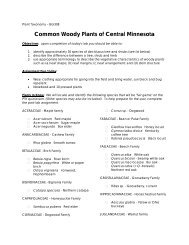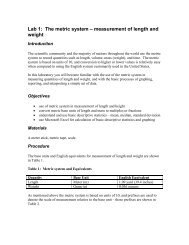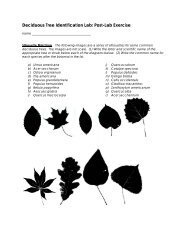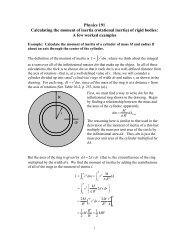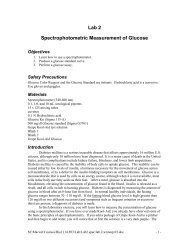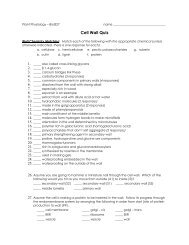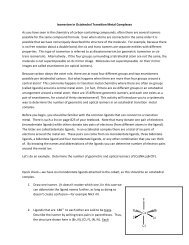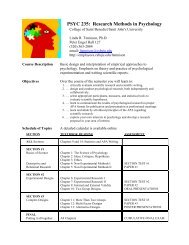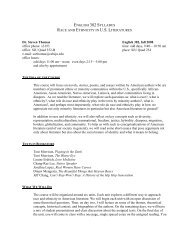Karl Marx Economic and Philosophical Manuscripts of 1844 Wages ...
Karl Marx Economic and Philosophical Manuscripts of 1844 Wages ...
Karl Marx Economic and Philosophical Manuscripts of 1844 Wages ...
Create successful ePaper yourself
Turn your PDF publications into a flip-book with our unique Google optimized e-Paper software.
53estranged, alienated labor. We have analyzed this concept, <strong>and</strong> inso doing merely analyzed an economic fact.Let us now go on to see how the concept <strong>of</strong> estranged,alienated labor must express <strong>and</strong> present itself in reality.If the product <strong>of</strong> labor is alien to me, <strong>and</strong> confronts me as analien power, to whom does it then belong?To a being other than me.Who is this being?The gods? It is true that in early times most production—e.g.,temple building, etc., in Egypt, India, <strong>and</strong> Mexico—was in theservice <strong>of</strong> the gods, just as the product belonged to the gods. Butthe gods alone were never the masters <strong>of</strong> labor. The same is true <strong>of</strong>nature. And what a paradox it would be if the more mansubjugates nature through his labor <strong>and</strong> the more divine miraclesare made superfluous by the miracles <strong>of</strong> industry, the more he isforced to forgo the joy <strong>of</strong> production <strong>and</strong> the enjoyment <strong>of</strong> theproduct out <strong>of</strong> deference to these powers.The alien being to whom labor <strong>and</strong> the product <strong>of</strong> laborbelong, in whose service labor is performed, <strong>and</strong> for whoseenjoyment the product <strong>of</strong> labor is created, can be none other thanman himself.If the product <strong>of</strong> labor does not belong to the worker, <strong>and</strong> if itconfronts him as an alien power, this is only possible because itbelongs to a man other than the worker. If his activity is a tormentfor him, it must provide pleasure <strong>and</strong> enjoyment for someone else.Not the gods, not nature, but only man himself can be this alienpower over men.Consider the above proposition that the relationship <strong>of</strong> man tohimself becomes objective <strong>and</strong> real for him only through hisrelationship to other men. If, therefore, he regards the product <strong>of</strong>his labor, his objectified labor, as an alien, hostile, <strong>and</strong> powerfulobject which is independent <strong>of</strong> him, then his relationship to thatobject is such that another man—alien, hostile, powerful, <strong>and</strong>independent <strong>of</strong> him—is its master. If he relates to his own activityas unfree activity, then he relates to it as activity in the service,under the rule, coercion, <strong>and</strong> yoke <strong>of</strong> another man.Every self-estrangement <strong>of</strong> man from himself <strong>and</strong> nature ismanifested in the relationship he sets up between other men <strong>and</strong>himself <strong>and</strong> nature. Thus, religious self-estrangement is necessarilymanifested in the relationship between layman <strong>and</strong> priest, or, sincewe are dealing here with the spiritual world, between layman <strong>and</strong>mediator, etc. In the practical, real world, self-estrangement canmanifest itself only in the practical, real relationship to other men.The medium through which estrangement progresses is itself apractical one. So through estranged labor man not only produceshis relationship to the object <strong>and</strong> to the act <strong>of</strong> production as to alien<strong>and</strong> hostile powers; he also produces the relationship in whichother men st<strong>and</strong> to his production <strong>and</strong> product, <strong>and</strong> therelationship in which he st<strong>and</strong>s to these other men. Just as hecreates his own production as a loss <strong>of</strong> reality, a punishment, <strong>and</strong>his own product as a loss, a product which does not belong to him,so he creates the domination <strong>of</strong> the non-producer over production<strong>and</strong> its product. Just as he estranges from himself his own activity,so he confers upon the stranger an activity which does not belongto him.Up to now, we have considered the relationship only from theside <strong>of</strong> the worker. Later on, we shall consider it from the side <strong>of</strong>the non-worker.Thus, through estranged, alienated labor, the worker createsthe relationship <strong>of</strong> another man, who is alien to labor <strong>and</strong> st<strong>and</strong>soutside it, to that labor. The relation <strong>of</strong> the worker to labor createsthe relation <strong>of</strong> the capitalist—or whatever other word one choosesfor the master <strong>of</strong> labor—to that labor. Private property is thereforethe product, result, <strong>and</strong> necessary consequence <strong>of</strong> alienated labor,<strong>of</strong> the external relation <strong>of</strong> the worker to nature <strong>and</strong> to himself.Private property thus derives from an analysis <strong>of</strong> the concept<strong>of</strong> alienated labor—i.e., alienated man, estranged labor, estrangedlife, estranged man.It is true that we took the concept <strong>of</strong> alienated labor (alienatedlife) from political economy as a result <strong>of</strong> the movement <strong>of</strong> privateproperty. But it is clear from an analysis <strong>of</strong> this concept that,although private property appears as the basis <strong>and</strong> cause <strong>of</strong>alienated labor, it is in fact its consequence, just as the gods wereoriginally not the cause but the effect <strong>of</strong> the confusion in men’sminds. Later, however, this relationship becomes reciprocal.It is only when the development <strong>of</strong> private property reaches itsultimate point <strong>of</strong> culmination that this, its secret, re-emerges;namely, that is (a) the product <strong>of</strong> alienated labor, <strong>and</strong> (b) the meansthrough which labor is alienated, the realization <strong>of</strong> this alienation.This development throws light upon a number <strong>of</strong> hithertounresolved controversies.54



